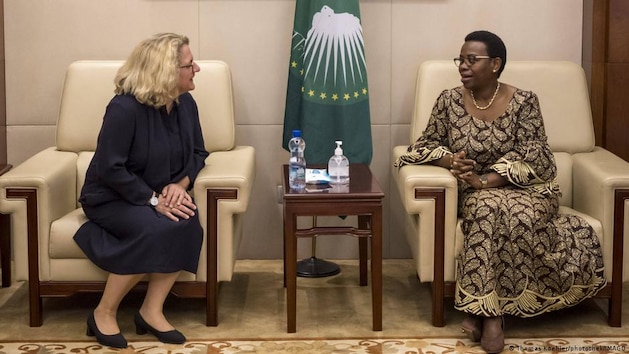Compared to her predecessor, Development Minister Svenja Schulze is modest. Former Minister Gerd Müller declared his concept to be the “Marshall Plan with Africa” and presented it with great fanfare in 2017. In political Berlin, no one is thinking about this anymore, large parts have remained on paper and the CSU minister, who was at least rhetorically extremely active, has withdrawn from politics.
In Schulze’s subtitle, the Africa strategy is called Africa strategy again. But the title reveals that the SPD politician, who has been in office since the end of 2021, also has big plans. “Shaping the future together with Africa” is the title of her paper. “We just don’t want the countries to be permanently dependent on us,” Schulze said at the presentation to DW. “We see how Africa is developing, what potential for innovation there is, how many young people are there. And we want to build networks, partnerships from which both benefit and not just one partner.”
And these partnerships should have new focal points. As in the coalition agreement, the topic of sustainability plays a major role. Hardly surprising in the age of climate change, the effects of which are clearly felt by African countries. Germany therefore wants to promote the social and climate-friendly restructuring of the African economy. Specifically, the development ministry wants to support countries in expanding renewable energies, for example. In addition, new jobs are to be created, especially for young people. According to the ministry, 25 million new jobs would have to be created on the continent every year. Because Africa is growing – by 2050, 2.5 billion people could live on the continent.
Olawunmi Ola-Busari, an analyst in the South African office of the development policy organization ONE, praises the focus of the new concept. “BMZ’s new Africa strategy is setting the right tone to further promote Germany’s development relations with Africa. She recognizes Africa’s growing influence in the world and wants to support the priorities that Africans have set for themselves in Agenda 2063 (the African Union’s development plan),” she told DW.
But in one crucial respect, the strategy is a clear departure from the previous course. The Marshall Plan wanted to encourage German companies to invest in Africa on a large scale. Ex-Minister Müller had promised numerous funding programs and also introduced some of them. “Economic cooperation doesn’t play a major role in this concept,” German Africa expert Robert Kappel told DW.
Only existing programs should be continued. In addition, there is no plan on how trade relations between Africa and Europe could be made fairer – for example with a view to subsidized agricultural products from Europe, which are fierce competition for African producers. A point that African governments keep asking for. “One would have expected a little more here,” says Kappel.
Business representatives react sniffly to the new paper: “Instead of providing new impetus for the promotion of private-sector projects and investments and thus counteracting the increasing presence of actors who, according to politicians, are system competitors, the paper largely amounts to describing existing initiatives and to formulate declarations of intent,” says Stefan Liebing, Chairman of the German-African Business Association. In practice, however, German economic commitment on the continent falls far short of political expectations.
However, another announcement could trigger heated discussions in Africa: The development ministry wants to place a special focus on the advancement of women. The funds that make a direct or indirect contribution to gender equality are to increase to 93 percent by 2025. The Ministry points out that women and girls in Africa are still discriminated against. “They have fewer chances of good education and training and are disproportionately active in the informal sector. In many African countries, girls are forced into marriage and access to health care and contraceptives is restricted,” the strategy reads.
While large sections of African civil society are likely to welcome the plans, it could strain relations with some governments. “That will certainly trigger discussions with governments and organizations,” says expert Kappel. Various African heads of state have long railed against what they see as cultural interference by Western countries. And for some male politicians, this also includes all too clear announcements or measures by Western countries in terms of equality.
It could look similar with the planned support of LGBTQ people. “There we will see mixed reactions to the continued discrimination and criminalization of this community in African countries,” says ONE expert Ola-Busari.
In the opinion of all experts, what the Schulze plan will ultimately be implemented does not only depend on the development ministry itself. “The ministry can only succeed if it gets support from the foreign, commerce and defense ministries. We demand a coherent Africa strategy from the entire federal government,” says Ola-Busari. But your wish may well remain unfulfilled. As early as 2017, when several ministries were working on Africa concepts at the same time, experts called for a coherent German overall concept. Nothing followed except for a piece of loose paper.
Author: Daniel Pelz
A new regulation will come into force from February 2023: Drivers will soon have to add an important product to their first-aid kit: a medical mask. If a mask is not included in the medical box, a police check could result in a fine of 5 euros.
On February 12, 2023, the parliamentary elections will be repeated in Berlin. The Federal Constitutional Court declared the original election of September 26, 2022 invalid. The re-election is said to cost taxpayers 40 million euros. All the latest news about redialing in the Newsticker.
The original of this article “What does the Development Ministry’s new Africa strategy achieve?” comes from Deutsche Welle.








